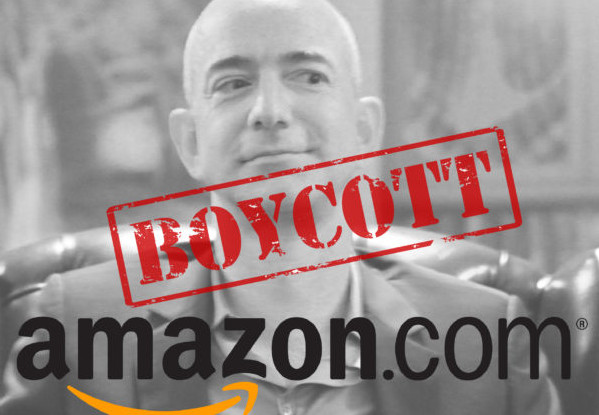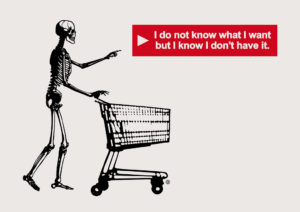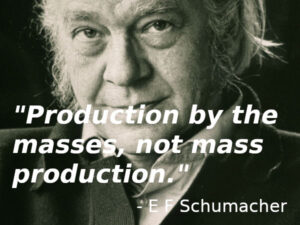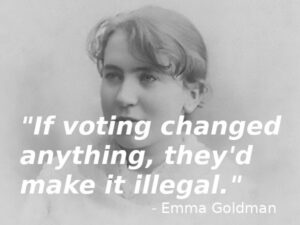
In 1983, Richard Stallman launched the GNU free software project, on which many people could collaborate, and in 1985 he founded the Free Software Foundation, to promote and assist the development of free software. Here is a page from his website, about Amazon. He has other pages dedicated to other exploitative megacorporations, but I thought I’d use his ‘copyright’ system (i.e. please distribute as long as you acknowledge) to try to draw attention to his wonderful, unbranded website. It’s full of absolute gems that will keep you entertained for a long time (if you’re anything like me). Over to Richard:
————————————————————————————————————————–
If you want to order a book (or something else), don’t buy it from Amazon. Amazon harms its customers, as well as workers, the national treasury, and many others that it affects.
Here’s a good (though long) overview of why Amazon’s overall activity is harmful to society overall.
This page lists alternatives to Amazon for buying various kinds of products. Some of these sites may share some of Amazon’s unethical practices. I am pretty sure that any site selling MP3 files on the internet imposes an EULA — an inexcusable wrong. Streaming sites, too. And all of them identify the purchaser. It is better to buy from a store, and pay cash. Or else get a copy through sharing.
For a book, order it directly from the publisher or through a local book store. If you want to use a URL to refer to a book, please don’t use an Amazon page.
Here are specific reasons — plenty of them.
Sabotaging customers
Amazon closes the accounts of customers that send back a substantial fraction of products they buy. It has the additional effect of stealing any credit balance.
Amazon appears to have cooperated with the US government to intercept a Thinkpad keyboard purchased by a Tor developer. To install a spy device, presumably.
Limiting the use of cash
Amazon’s new grocery stores do not accept cash. They impose the same surveillance as ordering online from Amazon.
In addition, success of this would mean the loss of thousands of jobs.
Restricting and shafting customers
Amazon distributes ebooks in a way that strips users of many freedoms (PDF or html).
Amazon’s on-line music “sales” have some of the same problems as the ebooks: users are required to identify themselves and sign a contract that denies them the freedoms they would have with a CD.
The Amazon Swindle has a back door that can erase books. We found out about this when Amazon remotely erased thousands of copies of 1984. In response to criticism, Amazon promised it would never do this again unless ordered to by the state, which I find not very comforting.
Amazon did not keep that promise. In 2012 it wiped a user’s Kindle and deleted her account, then offered her kafkaesque “explanations”.
The Swindle has a universal back door through which that Amazon can forcibly change the software. This is called “auto-update”. It puts the user helplessly at Amazon’s mercy.
Amazon’s book recommendations are not based honestly on algorithms that try to figure out what users might like. Publishers pay to have their books promoted this way.
Amazon rents textbooks to students with a requirement not to take them across state lines.
Amazon turns servile US public libraries into retail agents. Users have to register with Amazon and give their own email addresses. Then they get mail like this.
Subject: Your digital library loan expires soon Date: Sat, 13 Sep 2014 ... From: [email protected] To: LIBRARY-USER'S-EMAIL-ADDRESS Your digital library loan will expire in 3 days Hello LIBRARY-USER'S-NAME Your digital library book will expire in 3 days. If you purchase /BOOK/ from the Kindle Store or borrow it again from your local library, all of your notes and highlights will be preserved. BOOK (Author) AUTHOR <http://www.amazon.com/gp/product/PAGE>
Amazon “sold” someone Disney Christmas videos (via remote access, not a local copy); subsequently Amazon, at Disney’s command, cut off access for Christmas. This demonstrates why we should not trust remote hosting for copies of published works. Insist on having your own copy which is yours.
Amazon’s service, that offers you an MP3 for CDs you bought there, respects your rights less than ripping the CDs yourself.
Amazon’s complex financial arrangements bypass UK credit card consumer protection.
Amazon closes customers’ accounts, which implies confiscating their money, if they return too many defective products.
The company refuses even to discuss why.
Censorship
Amazon cut off service to Wikileaks, claiming that whistleblowing violates its terms of service. It had no need to go to court to prove this, because if you rent a server from Amazon, you have no enforcible legal right to use it.
Amazon censored an ebook that exposed how ebook bestseller lists can be manipulated (and therefore are meaningless).
Snooping
Since Amazon requires customers to identify themselves, it knows what each one has bought. That in itself is unacceptable, especially for books. I pay for books with cash only, and do not identify myself to any bookseller that takes note of which books I bought.
The Kindle Swindle informs Amazon when the user reads books that didn’t come from Amazon. It also tells Amazon which pages each user reads.
The Amazon “Smart” TV is watching and listening all the time.
Emo Phillips once made this joke: The other day a woman came up to me and said, “Didn’t I see you on television?” I said, “I don’t know. You can’t see out the other way.” Evidently Amazon has made that joke obsolete.
Exploiting workers mercilessly
Amazon’s shipping in the US is done in a sweatshop with paramedics standing by for workers who pass out from the heat.
Workers in an Amazon warehouse and shipping center walk all day under the orders of a computer, and are forbidden even to speak to each other.
A stress expert, looking at an undercover report about an Amazon warehouse, says these conditions make physical and mental illness more likely.
Working for Amazon makes staff physically and mentally ill.
Amazon pressures its “self-employed” delivery drivers to drive without seat belts; they aren’t given time to go to the toilet so they have to piss and defacate in the car.
This is perhaps not as bad for the individual as being unemployed, which is what they will become when Amazon gets driverless delivery vans. But that does not make it acceptable.
Amazon pays Mechanical Turk workers as little as 2 dollars an hour, making the excuse that they are “independent contractors”.
More on the horrible treatment of its workers.
Shafting others in the publishing world
Amazon squeezes small publishers. For instance, Amazon cut off Swindle sales for an independent book distributor in order to press for bigger discounts. (The article ends by promoting ebooks for another platform, the Shnook from Barnes and Noble. While that company is not as nasty to small publishers, its ebooks do violate your freedom in most of the same ways.)
Amazon doesn’t just compete with independent book stores, it arrogantly seeks to destroy them. Independent book stores urge people not to buy from Amazon.
Amazon appears to treat self-published authors well, but it can unilaterally cut the price of their books. And when it does, the authors are the ones who lose.
Amazon is lowering the pay for short self-published works by changing to pay per page read (sometimes as low as $0.006 per page).
Amazon is bad for books and writing.
Amazon is demonstrating its dangerous power by punishing one publisher with all sorts of unofficial discouragements to buy.
We should not allow any bookstore to be as big as Amazon.
Amazon’s hardball tactics against a publisher show its dangerous power.
Not that Hachette deserves any sympathy. The point is that we need to break Amazon’s power.
Dodging taxes
At least 10% of Amazon’s success is due to avoiding the taxes that physical book stores pay.
Amazon’s tax avoidance means it sucks money out of your country’s economy.
Amazon charges publishers for 20% sales tax in the UK even though the tax it pays is 3%.
UK independent bookstores condemn Amazon for not paying taxes as they do.
Amazon reorganized its EU structure in 2015 so it will pay a little tax on its sales to EU countries, but not much.
Vendors
Amazon sometimes chooses an expensive vendor by default — when the vendor pays for this preference.
Other reasons
After a bug in Amazon’s software caused Amazon to sell many products for one penny, Amazon takes no responsibility and dumps the loss on the sellers.
Amazon was a member of ALEC. ALEC is the right-wing lobbying group that promotes voter-suppression laws and “shoot first” laws, as well as attacks against wages and working conditions in the US.
Amazon quit ALEC after public pressure in May 2012, but I am sure it still supports the same nasty policies and is waiting for a new tool to achieve them.
A study found that people who read novels on the Amazon Swindle remember less of the the events in the novel.
I think issues like this are less important than the injustice of the Swindle.
Copyright (c) 2011-2015 Richard Stallman
Verbatim copying and redistribution of this entire page are permitted provided this notice is preserved.
The views expressed in our blog are those of the author and not necessarily lowimpact.org's




 How superstores destroy jobs and local resilience
How superstores destroy jobs and local resilience
 Companies like Fairphone, Ecotricity etc. are doing great things, but could easily be picked off by the corporate sector; why aren’t they co-ops?
Companies like Fairphone, Ecotricity etc. are doing great things, but could easily be picked off by the corporate sector; why aren’t they co-ops?
 Monopoly and capitalism: why you’ll lose at both if you try to play nice
Monopoly and capitalism: why you’ll lose at both if you try to play nice
 Buying green: is ethical consumerism a perfect distraction?
Buying green: is ethical consumerism a perfect distraction?
 Co-operatives
Co-operatives
 Copyleft
Copyleft
 Free & open source software
Free & open source software
 Low-impact shopping
Low-impact shopping
 Commons economy
Commons economy
 Platform co-ops
Platform co-ops
 Small is beautiful
Small is beautiful
 The 'democracy problem'
The 'democracy problem'


